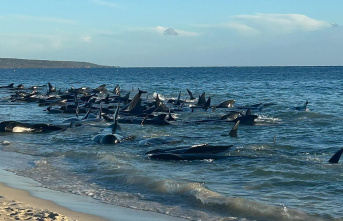In the high altitudes of the Greenland ice sheet, the first decade of the 21st century was the warmest analyzed for around 1000 years.
From 2001 to 2011, the average temperature was 1.5 degrees Celsius higher than the 20th century average. This is reported by a team led by Maria Hörhold from the Alfred Wegener Institute (AWI) in Bremerhaven. The group writes in the journal "Nature" that global warming can now also be detected in one of the most remote regions of the world.
She examined ice cores taken in north and central Greenland. Using the stable water isotopes, scientists can see how high the air temperatures were in the past. Since the evaluated time series only goes back to the year 1000, the researchers make no statements about the time before that. Scientists last examined ice cores from Greenland until 1995. "You hadn't seen any warming then - in contrast to the increase in global temperature," said Hörhold.
Drilling on the ice sheet "surprisingly clear"
In 2012, drilling was again carried out on the ice sheet. The samples showed the warming "surprisingly clearly". The results of the ice core surveys taken in 2019 are still pending.
The warming on the ice sheet also has an impact on meltwater runoff into the ocean and thus on sea level rise. From satellite observations of the change in ice mass, which were not part of the study, it can be seen that from 2003 to 2016 the annual meltwater runoff was twice as high as from 1961 to 1990.
The Greenland ice sheet is the second largest contiguous inland ice mass after the Antarctic ice sheet and reaches a height of more than three kilometers. "Natural temperature fluctuations of half a degree to one degree are normal at higher altitudes," said glaciologist Hörhold. The probability that the temperatures measured from 2001 to 2011 can be explained by natural fluctuations is close to zero. "This means that global warming has undoubtedly reached the Greenland plateau," says the researcher.











